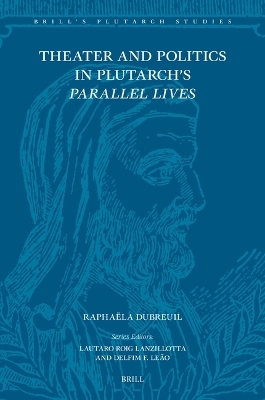
Theater and Politics in Plutarch’s Parallel Lives
Brill (Verlag)
978-90-04-68173-6 (ISBN)
An orator turns to an actor for advice, citizens expect assemblies to unfold like dramas, and a theater-goer cries at a play thinking of his fallen enemy: no Life escapes the mention of theatrical imagery in Plutarch’s paralleled biographies. And yet this is the first book not only to examine Plutarch’s consistent and coherent use of this imagery but also to argue that it is systematically employed to describe, explore, and evaluate politics in action. The theater becomes Plutarch’s invitation for us to question and uncover key moments of Athenian, Spartan, and Roman history as it unfolds.
Raphaëla Dubreuil, Ph.D. (2017), University of Edinburgh, publishes on different aspects of Imperial Greek literature, including forthcoming articles on Dio Chrysostom. She is a recipient of an IRC fellowship (Trinity College Dublin) and a DAAD (the Freie Universität zu Berlin).
Acknowledgements Ix
Introduction: Plutarch, Theater and Politics
0.1 Plutarch of Chaeronea
0.2 The Theatrical in the Parallel Lives
0.3 Demetrius–Antony
0.4 The Political Plutarch
0.5 Plutarchan Exceptionalism?
0.6 Readers, Theaters, and Cultures
0.7 The Scope of This Book
1 Demosthenes: Between Oratory and Acting
1.1 Voice, Delivery, and Morality
1.2 The Triumph of Oratory over Theater
2 Phocion: Democracy in the Theater
2.1 The Theater as Locus for the Statesman’s Virtue
2.2 Choregoi and Civic Values
2.3 Condemned in the Theater
3 Sparta: Performance in Foreign and Domestic Politics
3.1 Greek Theater and Spartan Victory in Agesilaus, Cleomenes, and Lysander
3.2 Poetry and Poets at Sparta
3.3 Lysander’s Revolutionary Theater
4 Roman Warfare: Violence and Conflict as Spectacle
4.1 Roman Spectacle of War
4.2 Triumph in Aemilius Paullus
5 Roman Politics: Sponsors and Audiences
5.1 Roman and Greek Statesmen in the Theater
5.2 Seating in the Theater
5.3 Theatrical Sponsorship and Political Character
6 Cicero: Roman Orator on Display
6.1 Roscius the Comedian and Aesopus the Tragedian
6.2 Cicero Contra Antony: Competing Models of Emotional Politics
6.3 Cicero’s Demise
Conclusion
7.1 Athens, Sparta, and Rome
7.2 The Theater as Destruction and as Reparation
7.3 Plutarch, Dio, and the Alexandrians
Bibliography
Index Rerum et Nominum
Index Locorum
| Erscheinungsdatum | 14.11.2023 |
|---|---|
| Reihe/Serie | Brill's Plutarch Studies ; 13 |
| Verlagsort | Leiden |
| Sprache | englisch |
| Maße | 155 x 235 mm |
| Gewicht | 1078 g |
| Themenwelt | Geschichte ► Allgemeine Geschichte ► Vor- und Frühgeschichte |
| Geschichte ► Allgemeine Geschichte ► Altertum / Antike | |
| Geisteswissenschaften ► Sprach- / Literaturwissenschaft ► Anglistik / Amerikanistik | |
| Geisteswissenschaften ► Sprach- / Literaturwissenschaft ► Literaturwissenschaft | |
| ISBN-10 | 90-04-68173-6 / 9004681736 |
| ISBN-13 | 978-90-04-68173-6 / 9789004681736 |
| Zustand | Neuware |
| Haben Sie eine Frage zum Produkt? |
aus dem Bereich


